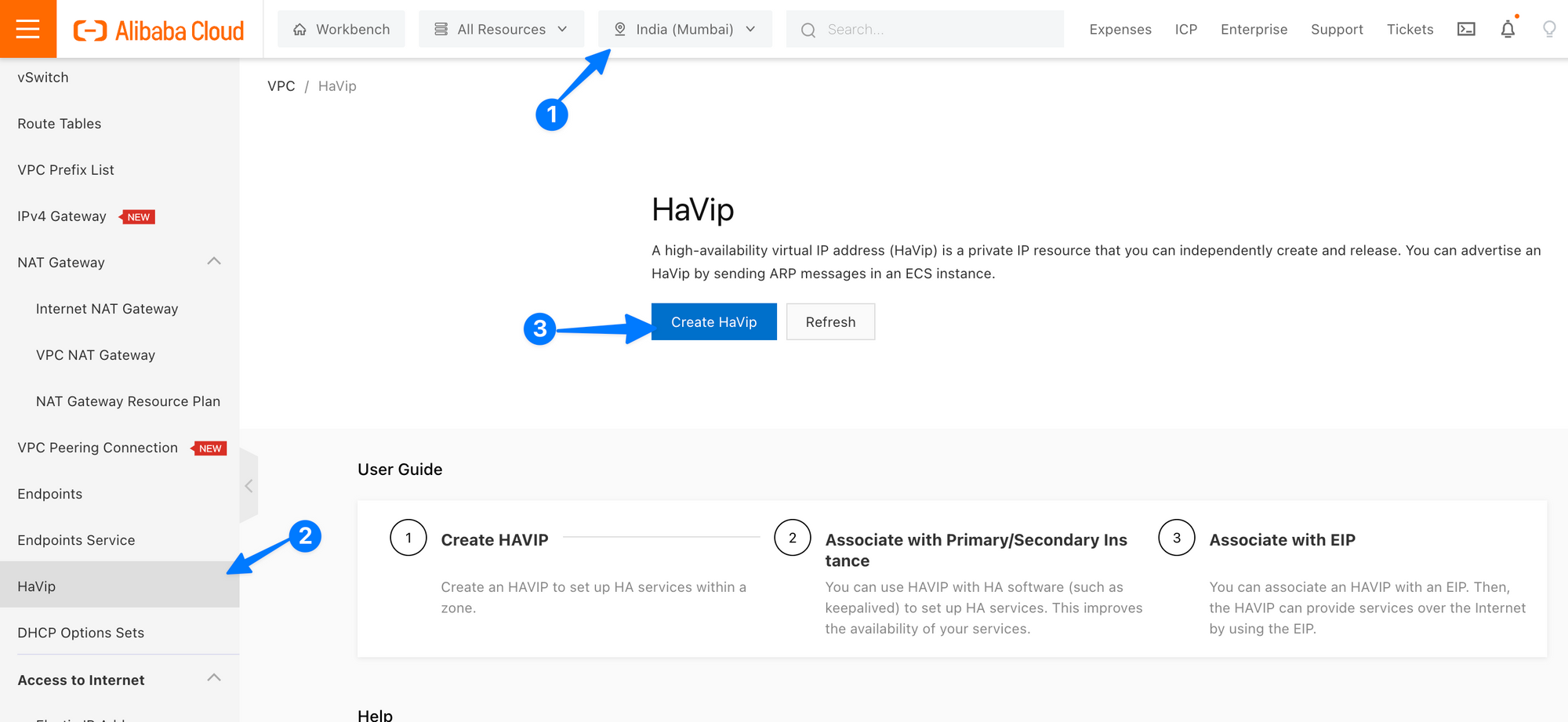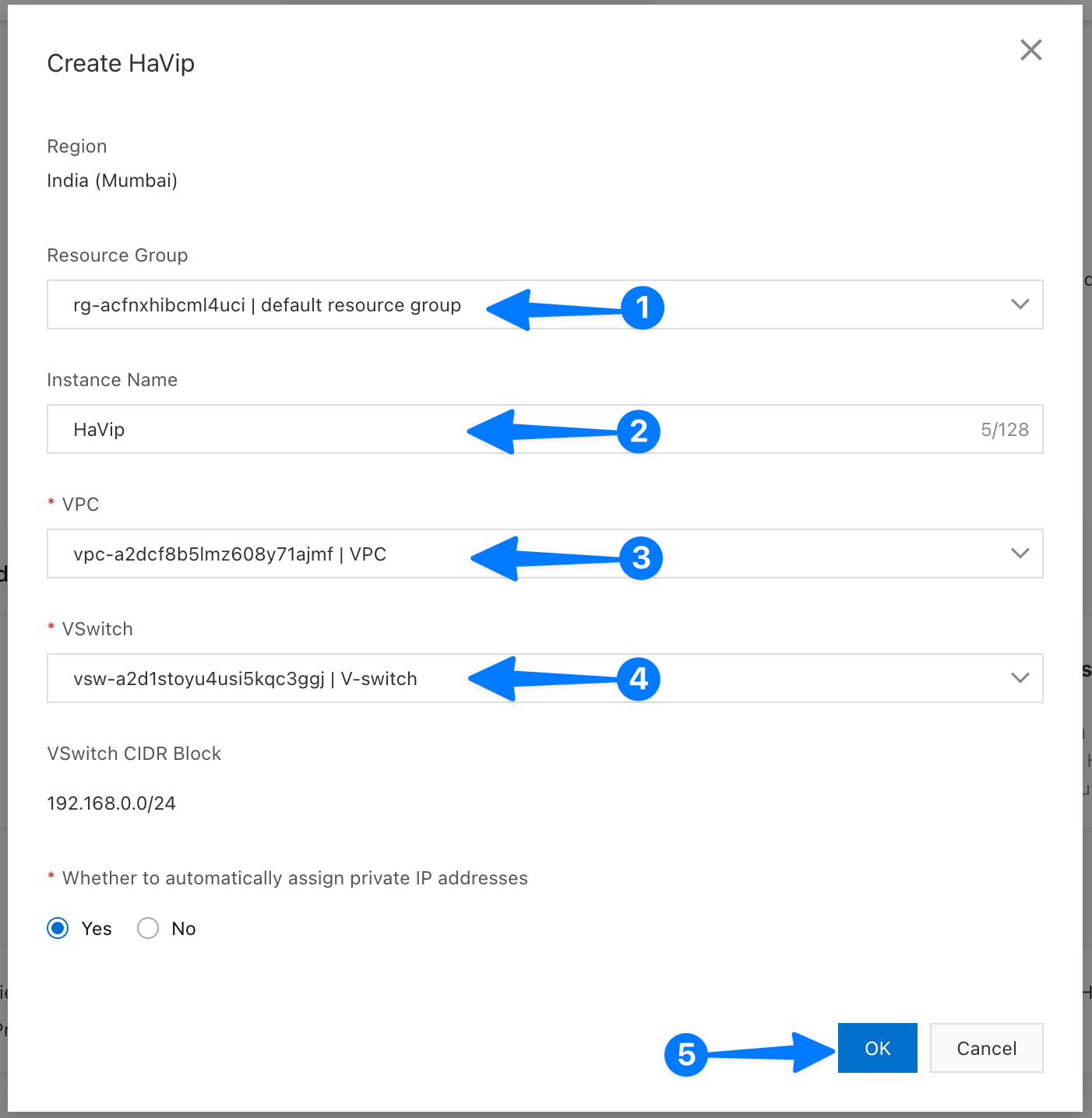Unlocking the Power of Alibaba VPC HaVip: A Step-by-Step Guide with a Real-World Use Case

Introduction:
Alibaba Cloud's Virtual Private Cloud (VPC) service offers a range of powerful networking features, including Highly Available Virtual IP addresses (HaVip's).
HaVip provides seamless failover and high availability for applications running within a VPC. In this blog post, we will explore what HaVip's are, and their benefits, and walk through a step-by-step guide on how to create HaVip's in Alibaba VPC.
Additionally, we will discuss a practical use case to illustrate the significance of HaVip in ensuring uninterrupted connectivity for applications.
What are HaVip's?
HaVips, or Highly Available Virtual IP addresses, are floating IP addresses that can be dynamically assigned to Elastic IP addresses (EIPs) or Network Interface Cards (NICs) within an Alibaba VPC. They enable applications to maintain consistent network connectivity even when there are changes or failures in the underlying network infrastructure.
Benefits of HaVip:
- High Availability: HaVip ensures that applications have uninterrupted network connectivity by quickly detecting failures and seamlessly redirecting traffic to backup resources.
- Seamless Failover: In the event of failures, HaVip automatically switches traffic to backup resources without disrupting the application's functionality.
- Easy Management: HAVIPs can be easily created, associated, and managed through the Alibaba Cloud console, providing a user-friendly experience.
- Scalability: HAVIPs support the scalability requirements of modern applications by allowing dynamic assignment to different resources within a VPC.
Creating HaVip's in Alibaba VPC: Step-by-Step Guide
Step 1. Log in to the Alibaba Cloud console and navigate to the Virtual Private Cloud (VPC) service.
Step 2. Choose the appropriate region for creating the HaVip.
Step 3. Access the "HaVip" section within the VPC console.
Step 4. Click on the "Create HaVip" button to initiate the creation process.

Step 5. Provide a descriptive name and relevant details for the HaVip.
Step 6. Select the VPC and vSwitch to associate with the HaVip.
Step 7. Choose the source type for the HaVip, either an Elastic IP (EIP) or a Network Interface Card (NIC).
Step 8. Specify the specific EIP or NIC that you want to associate with the HaVip.
Step 9. Configure advanced settings such as bandwidth and billing method.
Step 10. Review the configuration details and click on the "Create" button to create the HaVip.

Use Case Example: Ensuring High Availability for a Web Application
Let's consider a scenario where you have a web application hosted on Alibaba Cloud, and you want to ensure high availability and seamless failover in case of network failures.
Explanation:
- Internet: The entry point for incoming requests to the web application.
- Alibaba Cloud Load Balancer: Acts as the front-end component to distribute traffic across multiple backend servers. It provides scalability and load-balancing capabilities.
- HaVip: A Highly Available Virtual IP address assigned to the Load Balancer. The HaVip ensures seamless failover in case of network failures or changes in the underlying infrastructure.
- Backend Servers: The servers hosting the web application and processing the incoming requests.
Use Case Flow:
- Incoming requests from the Internet are directed to the HaVip.
- The HaVip forwards the requests to the Alibaba Cloud Load Balancer.
- The Load Balancer distributes the traffic across multiple backend servers to ensure high availability and optimal resource utilization.
- If a backend server becomes unavailable due to a failure or maintenance, the Load Balancer detects it and automatically redirects the traffic to the available servers.
- The HaVip monitors the health of the Load Balancer and the backend servers. If the Load Balancer or a backend server fails, the HaVip quickly detects the failure and redirects traffic to a backup Load Balancer or another available backend server.
- The web application running on the backend servers processes the requests and sends the response back through the Load Balancer and HaVip to the Internet.
Once created, associate the HaVip with your web server. The HaVip will provide high availability and failover capabilities, ensuring uninterrupted connectivity for your web application, even in the event of network failures.
Conclusion:
Alibaba VPC HaVip offers a reliable and efficient solution for achieving high availability and seamless failover in your applications within an Alibaba Cloud VPC. By creating HaVip's and associating them